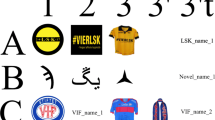Abstract
Northern Irish Protestant subjects, Northern Irish Catholic subjects, and English Protestant subjects were taught a series of conditional discriminations using a matching-to-sample procedure. In the presence of Northern Irish Catholic names, subjects were trained to select three-letter nonsense syllables, and in the presence of the nonsense syllables subjects were trained to select Northern Irish Protestant symbols. Subjects were then tested to determine whether the Protestant symbols and Catholic names had become related through symmetry and transitivity. A generalization test was employed to allow for a preliminary investigation of the transfer of experimentally generated equivalence responding to untrained, socially loaded names. Preliminary findings suggest that prior social learning might interfere with equivalence responding. The relevance of these results to the theoretical interpretation of the equivalence phenomenon and to social attitude measurement in general is discussed.
Similar content being viewed by others
References
BARNES, D. (1989). Behavior-behavior analysis, human schedule performance, and radical behaviorism. The Psychological Record, 39, 339–350.
BARNES, D., & KEENAN, M. (1989). Positive and negative transfer of stimulus functions and generalisation in the control of human schedule performance. Paper presented at the Easter meeting of the Experimental Analysis of Behaviour Group, Cambridge, Britain.
BECKETT, J. C. (1981). The making of modern Ireland. Great Britain: Falkenham Press Ltd.
CAIRNS, E. (1980). The development of ethnic discrimination in young children in Northern Ireland. In J. Harbison & J. Harbison (Eds.), Children and young people in Northern Ireland: A society under stress. Somerset: Open Books.
CAIRNS, E. (1983). The role of ethnic identity in the Northern Irish conflict. Paper presented to the Sixth Annual Scientific Meeting of the International Society of Political Psychology, Oxford.
CAIRNS, E. (1984). Social identity in Northern Ireland. Human Relations, 37, 1095–1102.
CAIRNS, E. (1987). Caught in crossfire: Children and the Northern Ireland Conflict. Belfast: Appletree Press. Syracuse University Press: Belfast: New York.
CAIRNS, E. (1989). Social identity and intergroup conflict in Northern Ireland: A developmental perspective. In J. Harbison, Growing up in Northern Ireland ( pp. 115–130). Belfast Universities Press.
CATANIA, A. C. (1984). Learning (2nd ed). Englewood Cliffs, NJ: Prentice-Hall.
CONNOLLY, J. (1983). Labour in Irish history. Dublin: New Books Publications.
DEVANY, J. M., HAYES, S. C., & NELSON, R. D. (1986). Equivalence class formation in language-able and language-disabled children. Journal of the Experimental Analysis, 46, 243–257.
DOWNING, T. (1980). “The Troubles: The background to the question of Northern Ireland.” Thames Television Ltd., London.
DUGDALE, N., & LOWE, C. F. (in press). Naming and stimulus equivalence. In D. Blackman & H. Lejeune (Eds.), Behavior analysis in theory and practice: Contributions and controversies. Brighton, UK: Lawrence Erlbaum.
FOSTER, R. F. (1988). Modern Ireland: 1600–1972. London: Allen Lane.
HAYES, S. C. (in press). A relational control theory of stimulus equivalence. In L. J. Parrott & P. W. Chase (Eds.), Dialogues on verbal behavior. Reno, NV: Context Press.
KEE, R. (1982). “Ireland: A history London: Sphere Books Ltd.
LYONS, F. S. L. (1971). Ireland since the famine. Glasgow: William Collins Sons & Co. Ltd.
MCINTIRE, K. D., CLEARY, J., & THOMPSON, T. (1987). Conditional relations by monkeys: Reflexivity, symmetry, and transitivity. Journal of the Experimental Analysis of Behavior, 47, 279–285.
O’DONNELL, E. E. (1977). Northern Irish stereotypes. Dublin College of Industrial Relations.
SIDMAN, M., RAUZIN, R., LAZAR, R., CUNNINGHAM, S., TAILBY, W., & CARRIGAN, P. (1982). A search for uniformity in the conditional discriminations of rhesus monkeys, baboons, and children. Journal of the Experimental Analysis of Behavior, 37, 23–44.
SIDMAN, M., & TAILBY, W. (1982). Conditional discrimination versus matching to sample: An expansion of the testing paradigm. Journal of the Experimental Analysis of Behavior, 37, 5–22.
STEELE, D. M. (1987). Teaching the relations of same, opposite, and different. Unpublished doctoral dissertation, University of North Carolina, Greensboro.
STRINGER, M. (1984). The utility of stereotypic face stimuli as disguised measures of intergroup attitudes in Northern Ireland. Unpublished D. Phil Thesis, New University of Ulster.
TAJFEL, H. (1978). Differentiation between social groups: Studies in the social psychology of intergroup relations. London: Academic Press.
WULFERT, E., & HAYES, S. C. (1988). Transfer of a conditional ordering response through conditional equivalence classes. Journal of the Experimental Analysis of Behavior; 50, 125–141.
Author information
Authors and Affiliations
Additional information
This research was supported by a grant awarded to M. Keenan and E. Cairns by the Garfield Weston Trust. Contributions from Andrew Watt were in partial fulfillment of the degree of Doctor of Philosophy at the University of Ulster, at Coleraine.
Rights and permissions
About this article
Cite this article
Watt, A., Keenan, M., Barnes, D. et al. Social Categorization and Stimulus Equivalence. Psychol Rec 41, 33–50 (1991). https://doi.org/10.1007/BF03395092
Published:
Issue Date:
DOI: https://doi.org/10.1007/BF03395092




